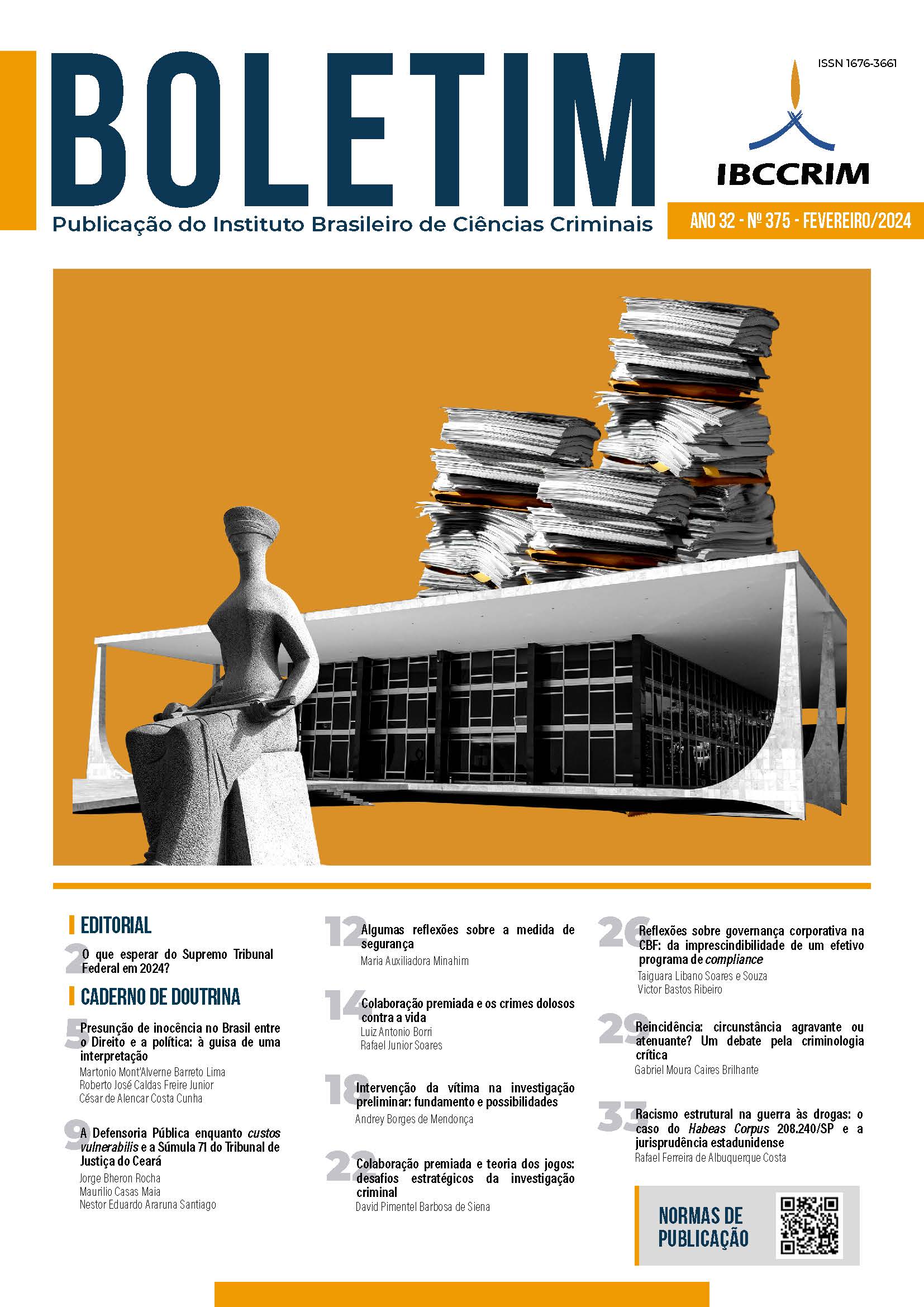Turn state’s evidence and game theory: strategic challenges of criminal investigation
Views: 181DOI:
https://doi.org/10.5281/zenodo.10552713Keywords:
Pleas, Probabilistic composition of preferences, Strategic communication and signaling, Criminal investigation, Informational justiceAbstract
This article examines the turn state’s evidence in the Brazilian legal system from the perspective of game theory and economic analysis. It addresses the importance of strategic communication and signaling in criminal investigations and highlights the need for a balance between justice and efficiency. It analyzes how game theory helps to understand the interactions between the parties involved and discusses appropriate regulation. It contributes to the debate on legislative and practical improvements related to turn state’s evidence, aiming to provide rationality to the criminal prosecution of criminal organizations.
Downloads
Publication Facts
Reviewer profiles N/A
Author statements
- Academic society
- Instituto Brasileiro de Ciências Criminais
- Publisher
- IBCCRIM
References
ABEL, Jonathan. Cops and Pleas: Police Officers’ Influence on Plea Bargaining. Yale Law Journal, New Haven, v, 126, n. 6, p. 1600-1971, 2017. Disponível em: https://www.yalelawjournal.org/essay/cops-and-pleas-police-officers-influence-on-plea-bargaining. Acesso em: 12 jan. 2024.
BERG, Nathan; KIM, Jeong-Yoo. Plea bargaining with multiple defendants and its deterrence effect. International Review of Law and Economics, [s. l.], v. 55, p. 58-70, 2018. https://doi.org/10.1016/j.irle.2018.04.002
BIBAS, Stephanos. Plea Bargaining Outside the Shadow of Trial. Harvard Law Review, Cambridge, v. 117, n. 8, p. 2463-2547, 2004. https://doi.org/10.2307/4093404
BITENCOURT, Cezar Roberto. Colaboração Premiada na “Lava Jato” está eivada de inconstitucionalidades. Consultor Jurídico, 4 dez. 2014. Disponível em: https://www.conjur.com.br/2014-dez-04/cezar-bitencourt-nulidades-delacao-premiada-lava-jato/. Acesso em: 12 jan. 2024.
BITENCOURT, Cezar Roberto. Colaboração Premiada é favor legal, mas antiético. Consultor Jurídico, 10 jun. 2017. Disponível em: https://www.conjur.com.br/2017-jun-10/cezar-bitencourt-delacao-premiada-favor-legal-antietico/. Acesso em: 12 jan. 2024.
BORRI, Luiz Antonio; SOARES, Rafael Junior. A readequação dos procedimentos processuais penais em face da colaboração premiada. Boletim IBCCRIM, São Paulo, ano 25, n. 296, p. 15-16, 2017.
COUTINHO, Jacinto Nelson de Miranda. Colaboração Premiada: posição contrária. Carta Forense, 2014.
GAMBETTA, Diego. Codes of the Underworld. Princeton, NJ: Princeton University Press, 2009.
GAROUPA, Nuno; STEPHEN, Frank H. Law and economics of plea bargaining. SSRN, [s.l.], 2006. https://doi.org/10.2139/ssrn.917922
GROSSMAN, G.; KATZ, M. Plea bargaining and social welfare. American Economic Review, [s.l.], v. 73, n. 4, p. 749-757, 1983. Disponível em: https://www.jstor.org/stable/1816572. Acesso em: 12 jan. 2024.
LANDES, William M. An economic analysis of the courts. Journal of Law and Economics, [s.l.], v. 14, p. 61-107, 1971. Disponível em:https://www.jstor.org/stable/724858. Acesso em: 12 jan. 2024.
LEWISCH, Peter. Criminal procedure. In: MARCIANO, A.; RAMELLO, G. (Org.). Encyclopedia of Law and Economics. Nova York: Springer, 2000. p. 241-260.
MARTINEZ-VAQUERO, L. A.; DOLCI, V.; TRIANNI, V. Evolutionary dynamics of organised crime and terrorist networks. Scientific Reports, v. 9, n. 9727, 2019. https://doi.org/10.1038/s41598-019-46141-8
NAGEL, S. S.; NEEF, Marian. Plea Bargaining, Decision Theory, and Equilibrium Models: Part I. Indiana Law Journal, Bloomington, v. 51, n. 4, 1976a. Disponível em: https://www.repository.law.indiana.edu/ilj/vol51/iss4/2/. Acesso em: 12 jan. 2024.
NAGEL, S. S.; NEEF, M. Plea Bargaining, Decision Theory, and Equilibrium Models: Part II. Indiana Law Journal, v. 52, n. 1, 1976b. Disponível em: https://www.repository.law.indiana.edu/ilj/vol52/iss1/1. Acesso em: 12 jan. 2024.
SANT’ANNA, A. P.arracho; GAVIÃO, Luiz Otávio; SANT’ANNA Thiago Lezan. Abordagem multicritério para a colaboração premiada. In: Anais do Simpósio Brasileiro de Pesquisa Operacional. Sociedade Brasileira Pesquisa Operacional: João Pessoa, 2020. Disponível em: https://proceedings.science/sbpo-2020/papers/abordagem-multicriterio-para-a-delacao-premiada?lang=pt-br. Acesso em: 12 jan. 2024.
Downloads
Published
How to Cite
Issue
Section
License
Copyright of published articles belongs to the author, but with journal rights over the first publication and respecting the one-year exclusivity period. Authors may only use the same results in other publications by clearly indicating this journal as the medium of the original publication. If there is no such indication, it will be considered a situation of self-plagiarism.
Therefore, the reproduction, total or partial, of the articles published here is subject to the express mention of the origin of its publication in this journal, citing the volume and number of this publication. For legal purposes, the source of the original publication must be consigned, in addition to the DOI link for cross-reference (if any).


 Português (Brasil)
Português (Brasil)
 English
English
 Español (España)
Español (España)










